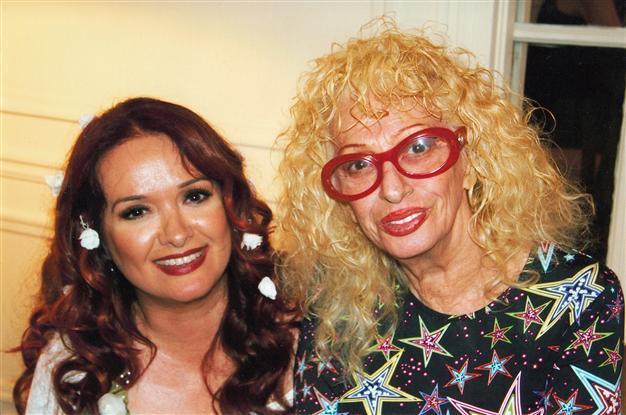Remembering Aysel Gürel and all her colors
EMRAH GÜLER

Nicknamed by her famous daughters, Müjde Ar (L) and Mehtap Ar, and those close to her as ‘Crazy Aysel,’ Aysel Gürel (R) was a poet and was lucky enough to have her poems delivered as songs by the biggest names in music, including Sezen Aksu .
“A genuine rainbow, Aysel Gürel was.” Well said to these words by İzzet Öz, the TV personality that brought Turkish pop music to every household decades ago long before private TV, dozens of radio channels and the Internet. Six years after the 80-year-old passed away, Gürel and her legacy continue to shine in our collective memory through her songs, and messages to women given in a style that was always unique to her own.Gürel, perhaps, is the single name that managed to touch the heart strings of many a generation in Turkey. She was a poet and was lucky enough to have her poems delivered as songs by the biggest names in music, including Sezen Aksu, Nilüfer, Tarkan and Sertab Erener. For more than three decades, Gürel wrote lyrics to some of the timeless classics on love and loss, as well as to popular tunes that to this day continue to help gyrate bodies on the dance floor.
The greatest lyricist Turkey had seen, she was. But there was always more to Gürel’s persona, making it almost impossible to pigeonhole her into a single identity. Originally an actress, Gürel took the stage by storm in a role that was quite befitting to the countless laments to loves lost she would go on to write. She had played Juliet in Shakespeare’s “Romeo and Juliet” by the age of 15.
Her acting career would be short-lived, as she went on to pursue a bigger passion, poetry. Gürel would take screen time once or twice every decade for one of the best reasons: because she could. Her true vocation would be in writing lyrics, to be sung by veteran names and newcomers alike. The lost and unrequited loves continue to this day to be “the mist on a grape,” “a love spell” and “the deep heart of a forest,” thanks to her songs.
‘Subconscious of Turkish women’
Like her personality, Gürel’s songs could alternate between the emotionally naked and the delightfully silly. Words with no apparent connection would follow one another to a surprisingly entertaining effect, while in one of her most heart-breaking songs on child brides, she would ask, “How many sheep is Ünzile worth?”
She was nicknamed by her famous daughters and those close to her as “Crazy Aysel,” the name being embraced affectionately by everyone else in Turkey. Gürel was a die-hard romantic, despite sharing on many occasions that she believed love was a “fairy tale” or an “illusion.” That was her persona, built on oppositions and contradictions.
She had many identities, and she wasn’t afraid to flaunt them to her pleasing. She was a poet, an actress, a well-educated Turcologist, an animal rights activist, a feminist, a single mother, an unabashed flirt, a cougar, or in her own words, “the subconscious of Turkish women.” She was no single woman, and every woman. She had single-handedly brought together the split halves of Turkish women in her kaleidoscopic persona. Jumping in and out of identities with a natural ease, Gürel never explained herself or answered to anyone.
Her witty repartees and cheeky answers made it impossible to pin her down. Gürel was always a visionary, well-aware of the dynamics of popular culture, how she could become part of it, and how she could alter it to its next stage. She knew every question that could be asked, and always had an answer ready. That was why she never became a joke.
Urban legends for a mythical persona
With her pink hair, sunglasses covering half of her face, and boyfriends half a century younger than her, Gürel was always the life of the party. She knew long before many that the best survival tool was humor, and more often than not, self-deprecating humor. When she kissed the pop singer Hürol, 60 years her younger, on the lips, she once again had shown that she was immune to a backlash that would have been a national scandal had it been any other famous woman of her age. The only question a TV presenter could ask was, “Are you in love?” Her answer was quick, “You should ask my husband.”
Gürel never backed down from her outlandish wardrobe or the colors of the rainbow on her hair. She also never backed down from her pack of cigarettes. Her stories verged on urban legends. Did she hitchhike with a garbage vehicle? Did she lift her skirt up to her head in front of her teen daughters’ high school to give them the best punishment of embarrassment? Did she refuse to talk to her daughters for weeks for killing a cockroach?
Gürel was always larger than the sum of her parts. She bordered on the mythical, and she deserved urban legends that highlighted her legendary persona. Bizarrely, she had taken after Rapunzel, a heroine you would presume to be quite down on her list. But she was quick to note the difference with the long-haired fairy tale character: “If Rapunzel has hair, I have an elevator.”
Her funeral, in 2008, turned out to be of many colors, with singers, filmmakers, writers, fashion designers, models, politicians, the young and the old coming together to pay their respects. Her signature sunglasses and pink faux-fur were laid on her coffin. Her last words were to Turkish women to never stop working, and to everyone to help the young. Music legend Orhan Gencebay perhaps said it best after Gürel’s death: “She said everything that could have been said, and left.”
















